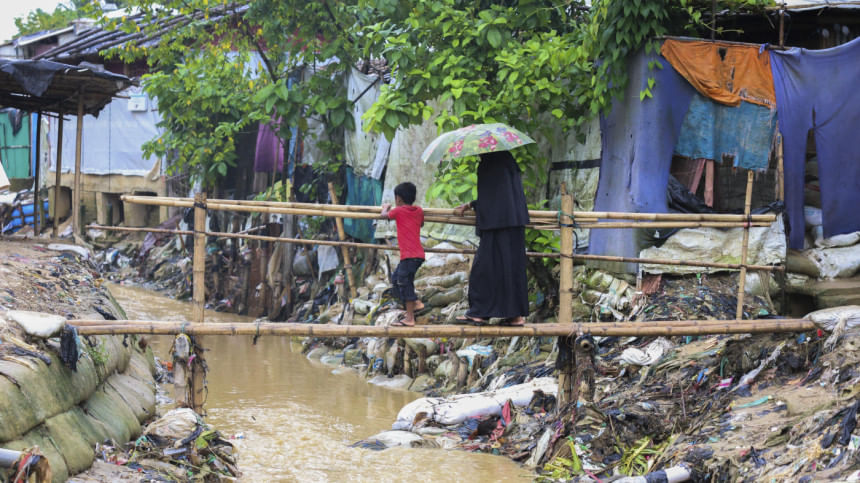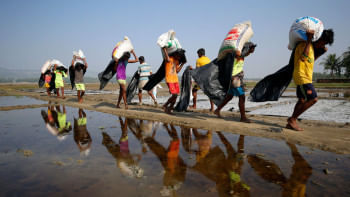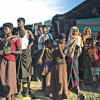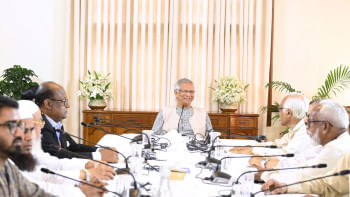The need to share responsibility for Rohingya refugees

Something remarkable happened last week in Cox's Bazar. Over 100 Rohingya from camps and the global Rohingya diaspora gathered with civil society, humanitarian and development partners, UN agencies, member states and Bangladesh government officials, including the chief adviser. This took place eight years after a surge in violence in Myanmar's Rakhine State in August 2017, which compelled more than 700,000 Rohingya to flee for safety in Bangladesh. Over two days, they discussed sustainable solutions and a new future for the Rohingya. This Stakeholder's Dialogue, organised by the Bangladesh government, marks the first time that Rohingya voices were included in high-level talks about decisions that affect their lives.
The day August 25, while being a moment to reflect on the ongoing challenges faced by 1.1 million Rohingya in Bangladesh, is also an opportunity to appreciate a singular solidarity: eight years ago, the Bangladeshi people stood shoulder-to-shoulder with the fleeing refugees. Homes and hearts across Ukhiya and Teknaf were opened. From village to village, Bangladeshi families gathered food and clothing to share with the Rohingya, who had walked for days with only the most meagre possessions. This display of solidarity remains inspiring to this day. The international community also rose in partnership, contributing humanitarian assistance and condemning the violence. Over time, the Cox's Bazar hills became the world's largest refugee settlement.
Across the border, conflict in Rakhine State continues to destroy farmlands, villages and livelihoods. Over the past 18 months, 150,000 Rohingya arrived in Bangladesh, forced to flee unrelenting and targeted violence. There is little for them in the camps, where they must squeeze into already overcrowded shelters with friends, relatives or strangers. Still, conditions in their homeland—from confiscation of land and property to forced labour and conscription, torture, sexual violence and the threat of being killed—leave them no choice.
Today, half a million Rohingya children born into statelessness live in camps: citizens of no country, dependent on foreign assistance for food, water, shelter, and nearly everything else. Meanwhile, an estimated 3.5 million people are internally displaced in Myanmar, just as unable to return to their homes as the refugees in Bangladesh.
Eight years on, the Rohingya people deserve a better solution. This life in limbo, in sprawling but temporary camps, is no match for their human potential. Rohingya refugees need strategic and innovative approaches that build skills and capacities through education and self-reliance training to rebuild their lives when conditions allow for a safe, voluntary and dignified return to their country. This will also help ensure longer-term peace in the region.
Refugee life was never meant to be a lasting condition. The millions of Bangladeshi refugees who fled in 1971 returned when the Liberation War was over. Returning home is also the Rohingya aspiration, but only when they can be confident that their lives will be safe and dignified there.
As the Rohingya themselves said in the conference, the solution lies in Myanmar. A political solution that addresses the root causes of displacement and invests in peacebuilding must be forged by governments, neighbouring states and regional bodies working together. The Stakeholders' Dialogue, where Rohingya men, women, youth, students and activists addressed the chief adviser and other leaders, was an important step in this direction. The High-Level Conference on the Situation of the Rohingya and Other Minorities in Myanmar, planned in New York for September 30, provides a critical opportunity for such action.
Too often, the global responsibility to shelter and protect people in need is politicised. As refugees are vilified, budgets to support them are slashed. Funding for the 2025 Joint Response Plan, the most basic needs package for Rohingya to live a dignified life in the refugee camps, is only about 60 percent funded. This means that funding for food is only secured until November 30 and cooking gas only through September. Healthcare and education services have already been cut. Across the board, humanitarian agencies had to cut jobs by nearly a third, affecting refugees, local and international staff.
In the face of such challenges, the international community must continue to show solidarity. Withholding aid cannot be the answer, nor closing borders. We must continue to uphold the right of people fleeing conflict and persecution to seek asylum.
Eight years on, the Rohingya count on our continued support. They rely on us—governments, development partners, civil society, the private sector and refugee leaders—to not only meet their basic needs, but to allow them to build resilience and self-reliance, preparing them for a future back in their homeland, where they can thrive in their communities. As UNHCR, we remain fully committed to this cause.
Juliette Murekeyisoni is acting UNHCR representative in Bangladesh. Once a refugee herself, she has dedicated her life and career to supporting and creating solutions for people forced to flee.
Views expressed in this article are the author's own.
Follow The Daily Star Opinion on Facebook for the latest opinions, commentaries and analyses by experts and professionals. To contribute your article or letter to The Daily Star Opinion, see our guidelines for submission.

 For all latest news, follow The Daily Star's Google News channel.
For all latest news, follow The Daily Star's Google News channel. 










Comments